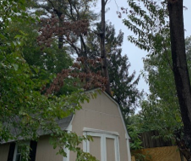
Hypoxylon canker is irreversible.
To make matters worse, it results in a hazard tree and an unappealing, unhealthy environment. And did we mention it’s commonly found in our area?
When worst comes to worst, it’s important to seek expert opinions from Certified Arborists. Their professional assessments will determine whether it’s time to say goodbye.
But first, what is hypoxylon canker and how do you know if your trees are suffering from it?
What is Hypoxylon Canker?
Hypoxylon canker is a fungal disease that leads to dead lesions, diminished tree structure, and a threatened landscape.
Hypoxylon canker:
- Primarily targets the oak species. In the DC Metro area, the primarily affected species is the oak variety – especially red oak!
- Occurs in stressed and older trees. Although the fungus can exist in healthy trees, it readily attacks and infects the sapwood of weaker trees.
- Causes trees to become extremely brittle. The tree disease causes a severe loss in structural strength. If too much strength is lost, the infected tree could potentially fall and damage surrounding structures.
What Are The Symptoms of Hypoxylon Canker?
Visually, the first signs of concern are usually yellowing or wilting leaves, death of upper branches, and a thinning canopy.
Symptoms of the tree fungus in oak trees appear in three stages:
- Reddish-brown to green crusty tissue over affected area
- Grey surface that flakes off and exposes dark brown to black color
- Small silvery patches converging into large strips



What Causes Hypoxylon Canker?
The tree fungus that causes hypoxylon canker doesn’t only exist in healthy trees, it exists in many of them – and their presence can span several years!
The key element is stress. If a tree is overly stressed or weakened, the fungus will be able to invade the sapwood. This, combined with other factors, ultimately results in tree mortality.
Leading factors can be grouped in three categories:
- Environmental: Fungal spores spread from one tree to the next. If the tree is too stressed, it will be less able to fight off the disease and will likely become infected.
- Urban Development: Stress from surrounding developments can contribute to tree decline and eventual tree death. In particular, construction can wound roots and/or contribute to soil compaction.
- Natural Factors: There are multiple ecological factors that can lead to hypoxylon canker. A few factors include weather stressors (drought, flooding, lightning, etc.), poor soil conditions, pest infestations & resulting defoliation, and competition or overcrowding.
How is Hypoxylon Canker Treated?
Preventative care is the best defense against hypoxylon canker.
As there is no treatment for the disease, proper maintenance and care is the best option to fight against the tree canker. This may include fertilization or mulching procedures, adjusting watering techniques, and routine pruning.
Unfortunately, while it’s ideal to take a proactive approach in tree care, sometimes issues can fall under radar. When it becomes a little too late, it’s important to ensure extreme caution is taken in taking the tree down.
Safety and expertise are especially important for trees affected by hypoxylon canker. As the lignin (“nature’s glue”) is torn up by the tree fungus, there becomes a lack of stable structure. This ultimately makes the tree even more difficult and dangerous to remove.


Professional tree removal:
- Prevents trees from falling on structures, streets, or powerlines
- Uses expert tools and technology such as mechanical lifts to ensure top safety
RTEC Treecare’s mission is to “Do the right thing for the people and nature.” One of the ways we do this is by prioritizing tree preservation.
Unfortunately, we understand this isn’t always possible. When you suspect your tree is sick, our Certified Arborists will provide expert assessments and determine the next steps.
We have a protocol in store for tree removals that will enable you to put your mind at ease. Safety is our utmost top priority, so we can do all the work and you can remain worry-free.
If you see any symptoms of hypoxylon canker, reserve an appointment online or call us at 703.573.3029.


